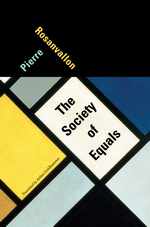
How does France reconcile the modern movement toward pluralism and decentralization with a strong central governing power? One of the country's most distinguished political historians offers a radical new interpretation of the development of democracy in France and the relationship between government and its citizens.
Since the publication of Tocqueville's Ancient Regime and the Revolution, French political structures have been viewed as the pure expression of a native Jacobinism, itself the continuation of an old absolutism. This interpretation has served as both a diagnosis of and an excuse for the inability to accept pluralism and decentralization as norms of a modern democracy, as evidenced in such policies as the persistence of the role of prefects and the ban on headscarves in schools.
Pierre Rosanvallon, by contrast, argues that the French have cherished and demonized Jacobinism at the same time; their hearts followed Robespierre, but their heads turned toward Benjamin Constant. The Demands of Liberty traces the long history of resistance to Jacobinism, including the creation of associations and unions and the implementation of elements of decentralization. Behind the ideological triumph of the state lies the conflicting creation of an active civil society.
In exploring these tensions, Rosanvallon takes the debate far beyond traditional views of liberalism versus republicanism and offers an innovative analysis of why the French system has worked despite Jacobinism.

Few would disagree that Western democracies are experiencing a crisis of representation. In the United States, gerrymandering and concentrated political geographies have placed the Congress and state legislatures in a stranglehold that is often at odds with public opinion. Campaign financing ensures that only the affluent have voice in legislation. Europeans, meanwhile, increasingly see the European Union as an anti-democratic body whose “diktats” have no basis in popular rule. The response, however, has not been an effective pursuit of better representation. In Good Government, Pierre Rosanvallon examines the long history of the alternative to which the public has gravitated: the empowered executive.
Rosanvallon argues that, faced with everyday ineptitude in governance, people become attracted to strong leaders and bold executive action. If these fail, they too often want even stronger personal leadership. Whereas nineteenth-century liberals and reformers longed for parliamentary sovereignty, nowadays few contest the “imperial presidency.” Rosanvallon traces this history from the Weimar Republic to Charles De Gaulle’s “exceptional” presidency to the Bush-Cheney concentration of executive power.
Europeans rebelling against the technocratic EU and Americans fed up with the “administrative state” have turned to charismatic figures, from Donald Trump to Viktor Orbán, who tout personal strength as their greatest asset. This is not just a right-wing phenomenon, though, as liberal contentment with Obama’s drone war demonstrates. Rosanvallon makes clear that contemporary “presidentialism” may reflect the particular concerns of the moment, but its many precursors demonstrate that democracy has always struggled with tension between popular government and concentrated authority.

Since the 1980s, society’s wealthiest members have claimed an ever-expanding share of income and property. It has been a true counterrevolution, says Pierre Rosanvallon—the end of the age of growing equality launched by the American and French revolutions. And just as significant as the social and economic factors driving this contemporary inequality has been a loss of faith in the ideal of equality itself. An ambitious transatlantic history of the struggles that, for two centuries, put political and economic equality at their heart, The Society of Equals calls for a new philosophy of social relations to reenergize egalitarian politics.
For eighteenth-century revolutionaries, equality meant understanding human beings as fundamentally alike and then creating universal political and economic rights. Rosanvallon sees the roots of today’s crisis in the period 1830–1900, when industrialized capitalism threatened to quash these aspirations. By the early twentieth century, progressive forces had begun to rectify some imbalances of the Gilded Age, and the modern welfare state gradually emerged from Depression-era reforms. But new economic shocks in the 1970s began a slide toward inequality that has only gained momentum in the decades since.
There is no returning to the days of the redistributive welfare state, Rosanvallon says. Rather than resort to outdated notions of social solidarity, we must instead revitalize the idea of equality according to principles of singularity, reciprocity, and communality that more accurately reflect today’s realities.
READERS
Browse our collection.
PUBLISHERS
See BiblioVault's publisher services.
STUDENT SERVICES
Files for college accessibility offices.
UChicago Accessibility Resources
home | accessibility | search | about | contact us
BiblioVault ® 2001 - 2024
The University of Chicago Press









